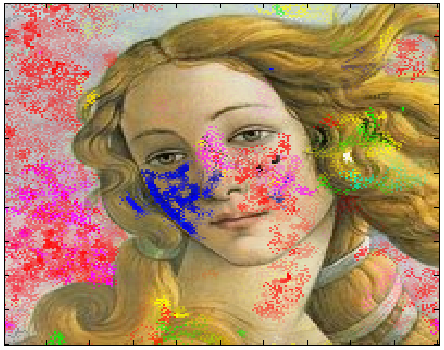February 13, 2009
Digga Darwin
Everybody seems to be celebrating Charles Darwin's bicentenary in different ways. During a talk I played around with setting up a little evolutionary process just for fun.

Agents move around on Botticelli's Venus, leaving coloured trails. They get scores based on how well the color of the pixel they enter matches some of their genes, and move depending on other genes. Every iteration the lowest-scoring agent is removed and replaced with a mutated copy of another one. The result is that agents evolve the ability to find areas that give them higher scores - or create them.
Ok, the result is at best like Rauschenberg and at worst just art vandalism. But it is pretty amazing that this very simple rule could rapidly generate - the fitness function is not trivial, the environment is changing and there are co-evolving organisms.
Celebrating Darwin is often conflated with celebrating the theory of evolution. But even without the discovery of his big theory he would have been a great naturalist. His studies on ecology, botany, hybridization, agriculture or other areas of biology would have been enough. One of my favourites is The Expression of the Emotions (1872), which both demonstrates the universality of many human emotions, their similarities with animal behaviour and lays the groundwork for examining emotion in a naturalistic way:
The term "disgust," in its simplest sense, means something offensive to the taste. It is curious how readily this feeling is excited by anything unusual in the appearance, odour, or nature of our food. In Tierra del Fuego a native touched with his finger some cold preserved meat which I was eating at our bivouac, and plainly showed utter disgust at its softness; whilst I felt utter disgust at my food being touched by a naked savage, though his hands did not appear dirty. A smear of soup on a man's beard looks disgusting, though there is of course nothing disgusting in the soup itself. I presume that this follows from the strong association in our minds between the sight of food, however circumstanced, and the idea of eating it.
It would have been fun to know what the native thought about the encounter with British "food".
While Darwin was not alone in thinking about evolutionary processes, I think he contributed much to the success of evolution theory by gathering strong and wide-ranging supporting data. One could easily imagine a situation like Alfred Wegener's plate tectonics, where a good idea would have languished for a long time (or even been apparently disproven) by lack of data. There is a lesson there for all who think they have a great insight: it is not enough to be right, you need to assemble a mountain of evidence too.
Turning to evolution, what I think is most amazing is not that local, short-sighted events produce a global "rational" outcome (although that is pretty amazing too!) Many other processes have this property, such as relaxation methods in mathematics or markets. The unusual property of evolution (shared with some markets) is that it is highly creative: instead of converging to something optimal, it tends to produce variations that grow into new directions. It finds new niches and new ways of exploiting niches. New kinds of bodies allow additions to the process, be it social organisation, learning, extended phenotypes and cultural transmission.
This creativity likely cannot happen in simple environment or with simple bodies. There must be differing environmental demands and sufficiently open-ended development systems to drive it. This is why my Botticelli-eaters will never evolve much further than in the image above: their environment has a pretty low complexity, their "bodies" are specified by a very limited number of parameters. There is a bit of a loophole in that different "species" can affect each other, but the overall effect is small. In the real world we have a complex environment with different phases of matter, different concentrations of matter and energy with varying statistical distributions on different timescales, and biological structures built up from the inside using a very versatile and open-ended code and machinery.
Darwin seems to have appreciated the strong links between individual organisms, their local communities, the ecosystem, the physical environment and their past. I think (although I'm hardly an expert on this) that this was a very early and fairly uncommon insight. He recognized that evolution is interactive and not just something that is imposed from the outside. It is bottom-up: a multitude of interactions meet in every organism, being refracted into development and behaviour that produces new interactions.
Thus, from the war of nature, from famine and death, the most exalted object of which we are capable of conceiving, namely, the production of the higher animals, directly follows. There is grandeur in this view of life, with its several powers, having been originally breathed into a few forms or into one; and that, whilst this planet has gone cycling on according to the fixed law of gravity, from so simple a beginning endless forms most beautiful and most wonderful have been, and are being, evolved.
(the title of the post refers to a song by the Swedish humorist Povel Ramel celebrating Darwin)